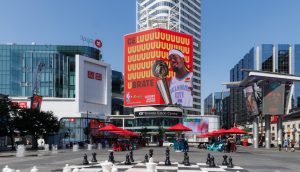The future of Toronto’s harmonized sign bylaw and its contentious Third Party Sign Tax (TPST) remains undecided this morning, with yesterday’s council vote postponed until today.
While this was the first snow-less November in Toronto in over 70 years, the first day of December produced a flurry of motions to alter aspects of the sign bylaw unveiled by City staff in October. The bulk of yesterday’s proceedings were largely taken up by councillors debating amendments to the bylaw that included everything from changes in wording to reductions in the tax amount proposed.
Councillor Norm Kelly proposed a reduction in the TPST from $10.4 million to $6.1 million a year, describing it as an ‘unprecedented tax’ that could have a potentially ruinous impact on Toronto’s out-of-home advertising industry.
‘I don’t want to see a scenario where this becomes a winner-take-all exercise,’ he explained. ‘What I’m trying to do is address the salient points the industry has brought to our attention and protect what I consider to be the essential interests of the City, various groups who are interested in this subject, and the interests of the industry itself.’
The Out-of-Home Marketing Association of Canada, which represents the country’s largest OOH advertising firms, claims that the TPST exceeds by 21% the Toronto out-of-home advertising industry’s profits of $8.6 million before interest and taxes, a figure the City disputes.
And councillor Doug Holyday suggested the TPST be eliminated entirely, saying the City has squandered any tax money it has got its hands on. ‘I think a new tax in the City of Toronto is the last thing we need,’ said Holyday. ‘We’ve had enough new taxes; we’ve spent all the money we’ve ever got our hands on, I’m sure we’ll spend more if we get our hands on this, and it won’t answer our problem.’
Kelly also suggested an easing of the restrictions governing the use of electronic billboards, which he said are emblematic of a progressive city. ‘I think of Toronto as a cutting-edge leading city, and if you don’t permit electronic signs we’ll probably be one of the last cities in the world that cuts and pastes advertisements,’ said Kelly.
But councillor Joe Mihevc argued that cutting-edge cities are actually ‘dramatically’ reducing the amount of out-of-home advertising they permit. ‘I would suggest those are the cities that are drawing the tourists, drawing the investments – that are better, liveable cities,’ he said.
Mihevc also chastised the out-of-home companies for the vigorous fight they’ve put up against the new sign bylaw and the TPST in particular. ‘Rather than be gracious, and recognize that for many of their signs they’ve gotten off the hook for a very, very long time…they’re bucking and they’re fighting right to the end,’ he said. ‘That is not civic-mindedness; that is pure and utter selfishness, and I don’t think we should be supporting them.’
Mihevc went on to call the TPST a ‘very modest’ tax, and pointed out that it had already been twice reduced, from $28 million to $18 million and again to the current $10.4 million. ‘You would understand if there would be some anger to whittling down something that people already felt they have compromised on two separate times,’ he said.
But Kelly said he was merely trying to implement a tax that would not prove punitive to the industry being taxed.
‘Sheep are meant to be shorn, not slaughtered,’ he said.
The final vote on the proposed bylaw is slated to take place today.























